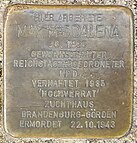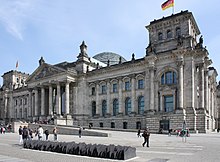Max Maddalena
Maximilian (Max) Maddalena (born January 17, 1895 in Riedheim , † October 22, 1943 in the Brandenburg-Görden prison ) was a German communist and resistance fighter against National Socialism .
Life
Maddalena, son of an Italian mosaic worker , joined the German Metalworkers' Association (DMV) in 1911 and the SPD in 1913 . In 1918 he switched to the USPD . After the union of the USPD (Left) with the KPD at the end of 1920, Maddalena was a member of the KPD.
He came from the simplest of backgrounds and spent most of his childhood and youth with his grandmother Monika Osswald in Riedheim , where he attended elementary school until 1909 . He worked as a locksmith in the Georg Fischer iron and steel works in Singen , where he also lived from 1913. Together with his mother, he was sentenced to prison by the Constance District Court in June 1913 for smuggling sweeteners. In 1914 he volunteered for the Navy , was promoted to NCO in 1917, was severely wounded several times and was finally awarded the Iron Cross 1st and 2nd Class and the Baden Medal of Merit.
From the autumn of 1920 to the end of 1924 he was in charge of the Singen administration of the German Metalworkers' Association (DMV). As a union leader, he appeared as a speaker at rallies and demonstrations. From January to April 1925 he worked in the trade union department of the Central Committee of the KPD and then headed the KPD district organization in Württemberg .
In October 1925 he became a member of the secretariat of the KPD district leadership Wasserkante in Hamburg . Since the general election in 1928 he was a member from May 1928 to March 1933 the Reichstag and was companion of known Communists as Ernst Thalmann (1886-1944), Walter Ulbricht (1893-1973) and Clara Zetkin (1857-1933). From late 1930 to mid-1932 he was a member of the Reich Committee of the Revolutionary Trade Union Opposition (RGO) and head of the metal industry group in the RGO. As a political agitator , he often came into conflict with the judiciary. Only his immunity as a member of parliament protected him from two years' imprisonment, to which he was sentenced in 1931.
From June 1932 Maddalena was a representative of the RGO at the Red Trade Union International (RGI) in Moscow . On March 11, 1935, he returned to Germany on behalf of the Central Committee of the KPD to support the illegal state leadership. On March 27, 1935, he was arrested in Berlin and held in Moabit remand prison. The People's Court sentenced Maddalena to life imprisonment on June 4, 1937 for “preparing for high treason” . Maddalena died in the Brandenburg-Görden penitentiary of a severe stomach disease, and medical care is said to have been inadequate.
Maddalena had a son of the same name. Max Maddalena junior (1917–1942) stayed in the USSR after emigrating in 1932 and fell victim to the Stalinist purges . Arrested twice - in 1938 and 1941 - and finally sentenced to five years' exile in the Krasnoyarsk Territory , the son died earlier than the father on July 14, 1942 in the prison hospital.
Honors

Streets in Rostock and Singen have been named after him. In 1959, Max-Maddalena-Strasse in Singen was renamed Harsenstrasse again in accordance with a municipal council resolution (during the “ Cold War ” many Communist victims of the Nazi regime were refused rehabilitation ). There is now a Max-Maddalena-Strasse again in a new development area in Singen.
His name is also recorded on a memorial stone for the victims of National Socialism in the forest cemetery in Singen. In 2011, a stumbling block was laid in front of Schwarzwaldstrasse 30 in Singen in honor of Max Maddalena .
In Hilzingen-Riedheim , his birthplace , a memorial stone was inaugurated at the entrance to the village on July 5, 2009 , reminding him of himself and his tragic fate.
In Brandenburg , the company vocational school of the former steel and rolling mill was named after him.
In front of the Reichstag building there has been a memorial for 96 members of the Reichstag who fell victim to the National Socialists since 1992 , including a plaque with Maddalena's name.
literature
- Maddalena, Max . In: Hermann Weber , Andreas Herbst : German Communists. Biographical Handbook 1918 to 1945 . 2nd, revised and greatly expanded edition. Karl Dietz, Berlin 2008, ISBN 978-3-320-02130-6 .
- Hildegard Bibby: Max Maddalena from Riedheim - trade unionist, communist and victim of National Socialism. In: Hegau-Jahrbuch 63, Singen / Hohentwiel 2006, ISBN 3-933356-41-5 , pp. 121-131.
- Luise Kraushaar et al .: German resistance fighters 1933–1945. Biographies and letters. Volume 1. Dietz, Berlin 1970, p. 615 ff.
- Andreas Herbst : Max Maddalena (1895–1943). In: Siegfried Mielke , Stefan Heinz (eds.) With the collaboration of Julia Pietsch: Emigrated metal trade unionists in the fight against the Nazi regime (= trade unionists under National Socialism. Persecution - Resistance - Emigration. Volume 3). Metropol, Berlin 2014, ISBN 978-3-86331-210-7 , pp. 661-672.
Web links
- Max Maddalena in the database of members of the Reichstag
Individual evidence
- ↑ Martin Schumacher (Ed.): MdR The Reichstag members of the Weimar Republic in the time of National Socialism. Political persecution, emigration and expatriation 1933-1945. Droste-Verlag, Düsseldorf 1991, ISBN 3-7700-5162-9 , p. 382.
- ↑ Wladislaw Hedeler; Inge Münz-Koenen (Ed.): "I came to your country as a guest ..." German opponents of Hitler as victims of the Stalin terror. Family fates 1933–1956. Lukas Verlag, catalog for the exhibition, Berlin 2013, ISBN 978-3-86732-177-8 , p. 233
| personal data | |
|---|---|
| SURNAME | Maddalena, Max |
| ALTERNATIVE NAMES | Maddalena, Maximilian |
| BRIEF DESCRIPTION | German politician (SPD, USPD, KPD), MdR |
| DATE OF BIRTH | January 17, 1895 |
| PLACE OF BIRTH | Riedheim |
| DATE OF DEATH | October 22, 1943 |
| Place of death | Brandenburg |

